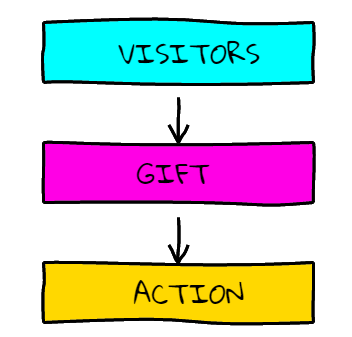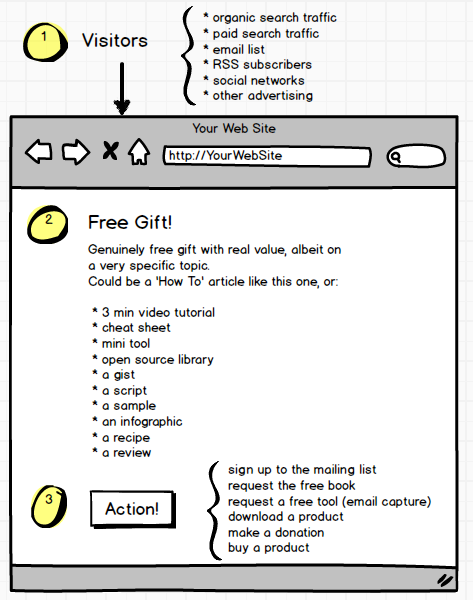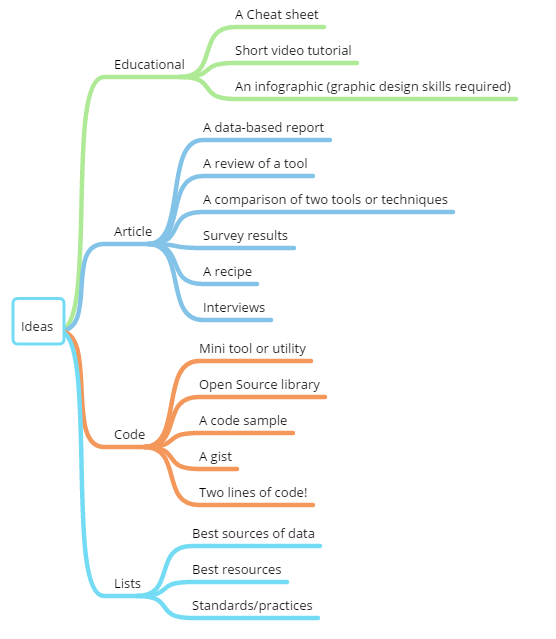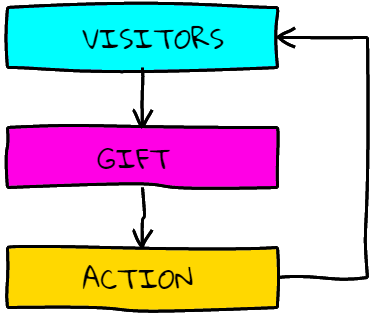
The Basics of Gift-Based Marketing
Hello my good friend and potential paying customer ;-). Welcome to this article, I hope to give you some information that you can use to turn your life around, win your freedom, and help thousands of others in the process.
I imagine you're a product developer who wants to promote a new product (possibly your first product) but you don't have any experience with "marketing". You may even think of "marketing" as about the dirtiest word in the English language. If that describes you, then I think you'll find "gift-based marketing" is the ideal way for a non-marketer to find success. Hence I think you should understand what it is, how it works, and see if it can work for you.
The technique is grounded in a psychological theory known as 'reciprocity' though the practice out-dates the theory.
Reciprocity means that in response to friendly actions, people are frequently much nicer and much more cooperative than predicted by the self-interest model.
—'wikipedia: reciprocity'
If done correctly, this is a form of marketing that won't make you hate yourself, because it's about giving real things of value to people who need them most. For example, I am attempting to give you (a person who wants to know how to market their product) something of real value: a technique you can use today. And all I'll ask in exchange is something quite small, which you'll only give if you think it's a fair exchange.

Here's the run sheet, and a graphic with extra detail:
-
A visitor arrives at your site. There's a bunch of ways for this to happen — and if you nail number 2 and 3, then this will literally take care of itself.
-
You give them a free gift. A genuine free gift. Obviously it's not cash, it's a digital gift of some sort. The best form of this depends on who you are: if you're a developer, it might be a gist, or a script or a simple single-purpose tool, or a cheat sheet, or a technical guide. It must tackle a very specific problem: so specific that it totally nails the target problem.
-
You ask for something in return. Something small.

Let's go through these in a little more detail:
1. Visitors
Somehow visitors arrive at your site.
Ideally they've arrived by word of mouth referrals, because your gifts and products are so astoundingly useful. They might also have turned up from organic searches, because the gift on your page is perfectly tuned to a common problem of your target market (research is the secret to getting this right!).
If you know that your gift is well-tuned to specific searches, and you can place a dollar value on a single visitor, then you might be able to afford paid search traffic, or to advertise in niche networks relevant to your area of expertise.
You may also have a social network presence, RSS subscribers or a healthy email list that you are communicating with directly.
2. Gift
You give a real gift, that actually solves a real problem. By necessity it must be a problem that is extremely specific and which your visitors are likely to experience.
Specificity is important because:
- you want to solve it completely, you cannot do this for a large problem
- you want the solution to be something you're willing to give away freely (no regrets!)
- it's cheaper to target search traffic on the far end of the long tail
- traffic on a very specific topic converts much better: your gift is more likely to be beneficial.
What sort of gift?
The exact form that the gift takes depends on who you are: what can you give away?
The most common form of gift seems to be "content". So much so that this entire marketing style is usually referred to as "content-based marketing." Content, or "writing" as it is also known, is great because it connects directly with the mind of a reader, there are endless topics and ways of approaching a topic, and it can be repackaged and re-delivered in countless ways.
But if you're not confident to begin with writing, you don't have to. If you're a software developer, the free gift can take many other forms besides written articles. It could be a tiny utility program. I've been giving away these things for more than ten years, and I've done it with no concern for reciprocity: it's great fun to give away programs that help people!
And it doesn't have to be a full program. It could be some sample code, a single function, a small snippet, a gist, or even as little as two lines of code if they are genuinely useful and do something that will give real help to a visitor.

Here's a longer list of ideas for Gifts, as included in the picture above:
- Educational
- A Cheat sheet
- Short video tutorial
- An infographic (graphic design skills required)
- Article
- A data
- A review of a tool
- A comparison of two tools or techniques
- Survey results
- A recipe
- Interviews
- Code
- Mini tool or utility
- Open Source library
- A code sample
- A gist
- Two lines of code!
- Lists
- Best sources of data
- Best resources
- Standards/practices
But in all of these things: the aim is to genuinely solve a real problem, in the way that suits your personality best (and that helps the recipient most).
3. Action
This is where the steel-radial meets the asphalt.
The most important lesson for 'first time' product creators is that they should actually ask for something in return. We find it just about impossible to put any value on our own work, outside of drawing a salary.
Having the courage to ask for something in return is the simple difference between nice guys who finish first and nice guys who finish last.
But what do we ask in return? The request shouldn't be out of proportion to the gift we've given.
Common requests include:
- follow me on twitter
- share this content (on facebook, twitter, or by email)
- sign up to the mailing list
- request the free book (email capture)
- request a free tool (email capture)
- download a product
- make a donation
- "buy me a coffee"
- buy my damn product!
People are reporting phenomenal benefits with mailing lists, which have made a resurgence in recent years. They give you an opportunity to build up a relationship with the visitor, and give you an ongoing stream of opportunities to help them out. Email courses (where a series of emails are delivered, one per day for 5 or 10 days) are a fantastic resource for easing a customer into a tricky topic, with a side benefit of establishing a relationship with a customer.
I am most absolutely and definitely not a fan of those popups that cover a site, demanding the "Action," before the visitor has had a chance to see anything. I'm certain that the superficial conversion metrics make them look like the cleverest idea in the world, but I can't believe that they're the best possible way to begin a long term relationship with a valued customer.
Re-giftable gifts!
You can take the whole process in a viral direction, by making the "action" something that causes new traffic.

Asking people to share your gift through their social networks is an attempt at generating more traffic. If the ratio of new traffic generated by existing traffic is greater than 1, then you have a viral hit on your hands.
So anyway...
Now of course having given you my best possible introduction to Gift-based marketing, it's only natural that I'll now turn around and ask for something in return.
I'm not going to ask you to take out your credit card, or ask you to join an email course. But I do think that if you're interested in building a product you should join the the list of people who I'll notify when the book 'Your First Product' is ready.
My book "Choose Your First Product" is available now.
It gives you 4 easy steps to find and validate a humble product idea.